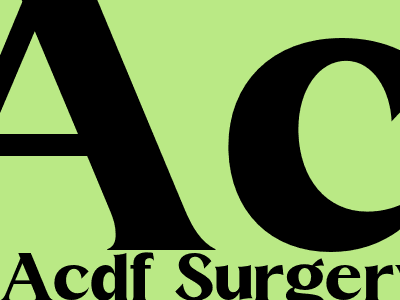How ACDF Surgery Helps to Fix Neck Pain
What is ACDF Surgery?
ACDF (anterior cervical discectomy and fusion) is a surgical procedure most commonly used to treat neck pain caused by conditions such as herniated discs or bone spurs. It involves removing the damaged intervertebral disc and replacing it with a bone graft to provide stability to the spine.
Benefits of ACDF Surgery
ACDF surgery offers numerous benefits, including:
- Reduces neck pain and inflammation
- Improves range of motion
- Stabilizes the spine
- Relieves pressure on nerves
Types of ACDF Surgery
There are two main types of ACDF surgery:
- Anterior Cervical Discectomy: Involves removing the damaged disc through an incision made in the front of the neck.
- Posterior Cervical Discectomy: Involves removing the disc through an incision made in the back of the neck.
Risks and Complications of ACDF Surgery
As with any surgical procedure, ACDF poses certain risks and complications, such as:
- Bleeding
- Infection
- Nerve damage
- Adjacent disc herniation
However, these risks are generally rare, and most patients experience a successful outcome with ACDF surgery.
Who is a Candidate for ACDF Surgery?
ACDF surgery is typically recommended for individuals who have tried conservative treatments such as physical therapy, medication, or injections without significant relief. Candidates should meet the following criteria:
- Severe neck pain that radiates into the arms or hands
- Loss of range of motion
- Neurological symptoms such as numbness or weakness
- Disc herniation or bone spurs that compress nerves
Recovery from ACDF Surgery
Recovery from ACDF surgery typically takes several months. During this time, patients may experience pain, swelling, and discomfort. Physical therapy and rest are essential for a successful recovery.
Conclusion
ACDF surgery is a common and effective treatment for severe neck pain caused by herniated discs or bone spurs. It offers numerous benefits, but it also poses certain risks. Before undergoing ACDF surgery, it is important to carefully consider the potential benefits and risks with a qualified surgeon.

Comments